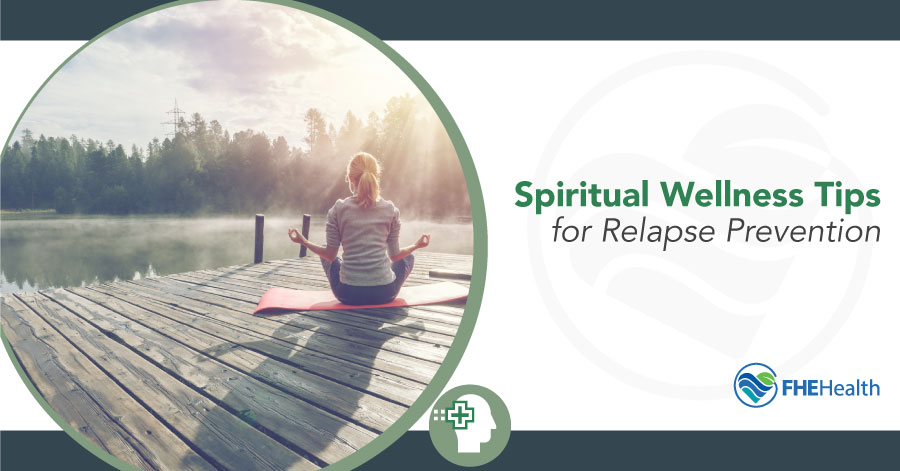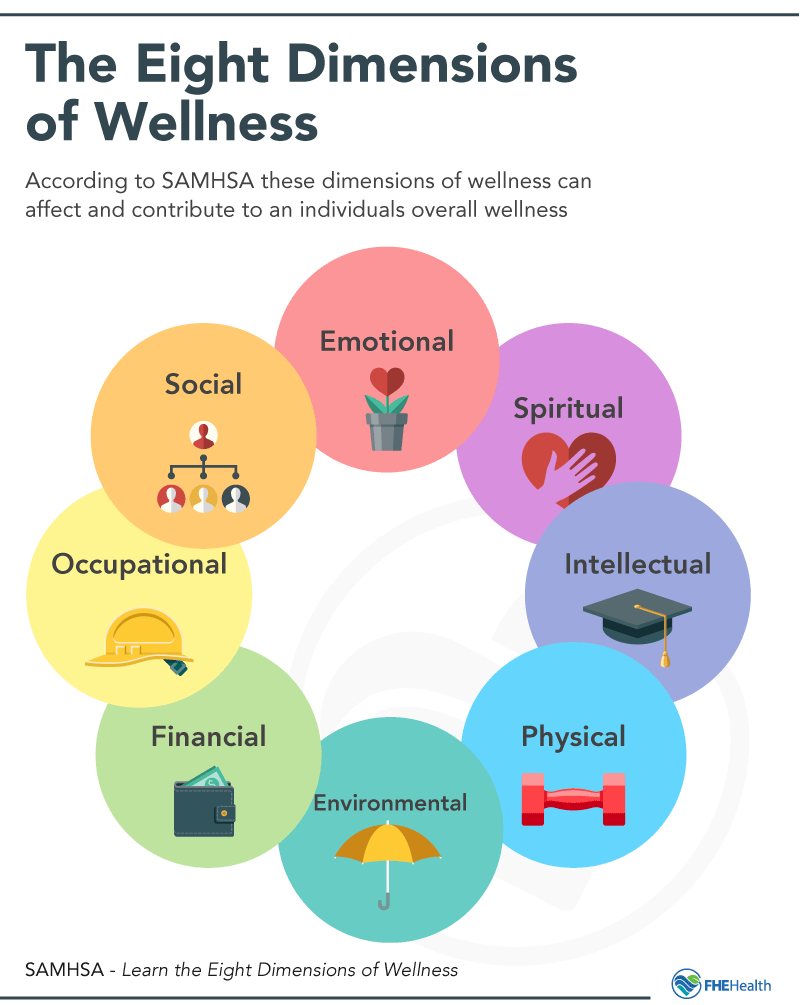
A growing number of mental health and addiction rehab programs, including FHE Health, take a holistic approach to treatment. A person is not their addiction or diagnosis, and treating the entire person often leads to an increased likelihood of long-term recovery. One aspect of holistic treatment is addressing wellness and spirituality in the addiction recovery process. Learn more about how this can play a role in relapse prevention below.
What Is Spiritual Wellness?
A holistic approach to wellness and spirituality in the addiction recovery process focuses on physical and spiritual health and well-being. Finding a purpose in life is often a key ingredient of spiritual wellness, along with each person’s search for contentment and meaning. Some people find spiritual enlightenment in religion, while others find it in daily spiritual practices such as yoga and meditation. Any practice that improves spiritual health is valuable in preventing addiction relapse.
Spiritual wellness is, perhaps, more difficult to define than some of the other dimensions. It’s not, as many might assume, the same thing as religion.
Publications from SAMHSA note that spiritual wellness involves searching for meaning and purpose in life. For some, this might relate to organized religion, but spiritual wellness steps beyond that to a greater understanding of the world and universe around us.
Dimensions of Wellness
It takes emotional resources to follow spiritual wellness relapse prevention strategies, and all dimensions of health are important for recovery. Acting in your own best interest requires paying attention to all facets of well-being and learning new, healthy habits. The self-awareness a person gains from strong spiritual health contributes to the ability to replace unhealthy habits with new routines designed to prevent addiction relapse. Strengthening the eight dimensions of wellness below can help with addiction recovery.
Emotional
Being honest with ourselves about our feelings and finding healthy ways to cope with them. Understanding what truly matters to us and trying to live by those values. Keeping an open mind and heart towards others’ feelings and perspectives.
 Spiritual
Spiritual
Actively trying to figure out what our values and purpose are and doing our best to live in line with them. Finding peace and meaning in the beliefs and practices that resonate deeply with our emotions and inner selves.
Intellectual
Staying curious and open to new ideas and experiences. Continuously learning and growing throughout life, and sharing what we learn with others.
Physical
Giving our bodies the exercise and good food they need, and making time for self-care and looking after ourselves. Taking any necessary medications or supplements and getting enough good sleep.
Environmental
Creating a healthy environment for our emotional and physical well-being while also respecting the natural world around us. Understanding how our surroundings and the people in them can affect how we feel.
Financial
Setting both short-term and long-term money goals and planning for unexpected costs. Learning how to manage our finances and live within our means. Recognizing that everyone has different values and goals when it comes to money.
Occupational
Valuing the unique contributions we make at work and having a positive attitude towards our jobs. Doing work that feels meaningful and aligns with our personal values and goals.
Social
Developing positive relationships and nurturing healthy connections with friends and family. Being there to listen to and support others while also being open to receiving help and building intimacy.
The Benefits of Wellness and Spirituality in the Addiction Recovery Process
SAMHSA encourages medical and mental health providers to talk to patients about spiritual beliefs, stating that patients with high spiritual wellness have a mortality rate that’s 18% less than the rest of the population. Those same benefits carry into the addiction space. Spirituality has been shown to help drive better coping mechanisms and reduce anxiety, depression, and substance abuse.
Spiritual Wellness and Relapse Prevention
Pink cloud psychology refers to the phase of recovery in which a person feels strong and accomplished because they’ve kicked the habit. Having a strong spiritual grounding can help strengthen and extend this healthy phase of addiction recovery. Spiritual wellness provides tools for resisting high-risk situations such as being offered drugs by others. Experts recognize eight dimensions of wellness, which all contribute to health, well-being, and addiction relapse prevention.
The End of Pink Cloud Syndrome
Pink cloud syndrome refers to the immediate time after becoming sober. It’s also called the honeymoon period because it’s often filled with a natural high from living this new lifestyle successfully. Unfortunately, it doesn’t last forever, and coming out of it into the “real” world can cause some stress. Eventually, living sober gets hard, and this is when many people turn back to drugs or alcohol.
Spiritual health involves proper lifestyle, connection with others, questioning the meaning of life, and transcendence, according to a study published by the National Institutes of Health. All of these things combine to create a foundation that someone can stand on after the pink cloud syndrome wears off. That can help reduce the chance that someone turns back to substance abuse.
Stressful or High-Risk Situations
Stressors and triggers play a role in someone’s recovery for life. Life is never without some of these elements, which is why so much of rehab is about learning to understand the root causes of your addiction and working to develop healthier coping mechanisms so you don’t start relying on drugs or alcohol again.
A healthy spiritual foundation, whether that comes from organized religion or something personal and less defined, can provide a basis for many healthy coping mechanisms. Recognizing that you answer to a higher power, whether you call it God or the Universe, also gives you permission to explore your own weaknesses while you rely on something outside of yourself for strength.
Many people actually end up dealing with addiction because they sought something outside of themselves and found drugs. Spiritual wellness ensures you seek something more positive and healthier.
Invitations to Abuse Substances From Others
Social pressures or being around other people who are continuing to abuse substances is a common reason for relapse. Spiritual wellness typically involves some type of accountability system, whether it’s to an organized rule set, a higher power, or the innermost you. That accountability can make it easier to say no both to friends and to drugs or alcohol.
Relapse Prevention Strategies: Tips for Improving Spiritual Wellness
So, how do you improve spiritual wellness so you can benefit from it? Spiritual health is a very personal thing for many people, which means that providers and therapists can typically only provide some guidelines or help point you in the right direction. To maintain this important dimension of overall wellness, you have to be able to work on it for yourself. Here are some tips for doing so.
- Consider the AA/NA approach. The 12-step program integral to AA has spiritual wellness at its roots. During the steps, you recognize a higher power and realize that you must submit to that higher power instead of letting substances control your life. By the final step, you are called to experience a spiritual awakening that’s a slow, steady change that increases your spiritual wellness for relapse prevention.
- Join organized religion. If this route appeals to you, join a church or other form of organized religion. Joining the right congregation can ensure you have a willing, helpful support network and pastors and other leaders ready to mentor you into growing your spiritual health.
- Practice prayer and meditation. If organized religion doesn’t feel like the right path for you, work to create your own path to spiritual health via regular prayer, meditation, and other mindfulness activities.
How to Assess Your Spiritual Wellness
Asking questions of yourself, your world, and your place in that universe are ways you can assess your wellness and spirituality in the addiction recovery process. Consider whether you feel like you have a purpose in life and can articulate it. Ask yourself whether you have any spiritual beliefs or rituals. Have you accepted and forgiven yourself and others, and do you reach outside of yourself via prayer or other methods to something greater in the universe?
If you can’t answer yes to some of these questions, your spiritual wellness may be suffering.
Your Journey to Wellness Starts Here
At FHE Health, we don’t treat addiction or other issues in a vacuum. We know that people are much more than one facet of their bodies and minds in this moment. If you would like to journey to wellness as you work through addiction recovery, reach out to us today to find out more about ways we can help.






